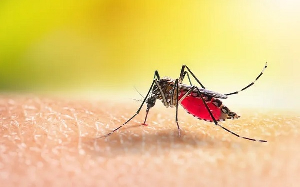 Mosquito is known to transmit malaria to humans. File photo.
Mosquito is known to transmit malaria to humans. File photo.
The Director-General of World Health Organisation (WHO), Dr Tedros Adhanom Ghebreyesus, has said that with strong political commitment, sustained investment, multisectoral action and community engagement, malaria can be defeated.
According to him, revitalised efforts at all levels, from global policy to community action, will accelerate progress towards malaria elimination.
“The history of malaria teaches us a harsh lesson. When we divert our attention, the disease resurges, taking its greatest toll on the most vulnerable. But the same history also shows us what’s possible; strong political commitment, sustained investment, multisectoral action and community engagement to defeat malaria,” he indicated.
According to a WHO report, despite significant gains, malaria remains a major public health challenge, with nearly 600,000 lives lost to the disease in 2023 alone.
The African region is hardest hit, shouldering an estimated 95% of the malaria burden each year.
Speaking on the World Malaria Day 2025, under the theme, “Malaria ends with us: reinvest, reimagine, reignite,” the Director of the WHO Global Malaria Programme, Dr Daniel Ngamije, called for stepped up political and financial commitment to protect the hard-won gains against malaria.
“Ministers must be committed to strengthening their health systems, stepping up domestic resources, enhancing multisectoral action and ensuring a robust accountability mechanism, this is the kind of leadership the world must rally behind to fight malaria,” he noted, according to a report on the WHO official website.
Dr Daniel Ngamije also said that reigniting commitment at all levels – from communities and frontline health workers to governments, researchers, the private sector innovators and donors – will be critical to curbing and, ultimately, ending malaria.
The report added that to reinvest, WHO joins partners and civil society in calling on malaria-endemic countries to boost domestic spending, particularly in primary health care, so that all at-risk populations can access the services they need to prevent, detect and treat malaria.
MRA/AE
Meanwhile, watch GhanaWeb’s tour of Odweanoma Paragliding Field below:
